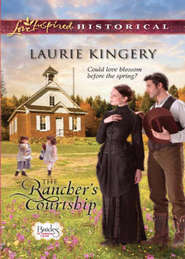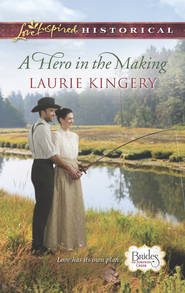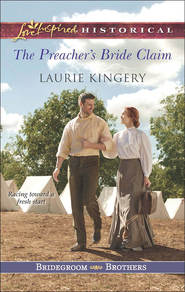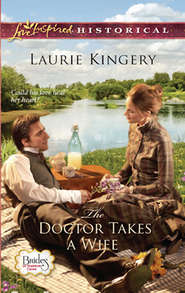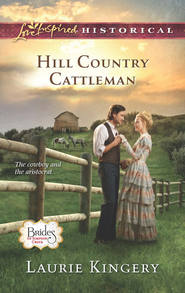По всем вопросам обращайтесь на: info@litportal.ru
(©) 2003-2024.
✖
Lawman In Disguise
Настройки чтения
Размер шрифта
Высота строк
Поля
* * *
He’d thought at first she was a dream, a vision conjured up by the effects of the laudanum, which fogged his brain and made opening his eyes wider than slits seem impossible. But he’d been aware of her presence and had even stolen a peek when she turned to stare at his wounded leg and shoulder, both now all properly cleaned up and bandaged.
Daisy. He’d heard the doctor call her that. The name suited her. Thorn could see that she’d been a beautiful woman once—and could be again, if someone cared enough to look after her. That careworn look would fade, he knew, with the right man at her side. Evidently, Billy Joe’s father hadn’t been the right man, not by a long shot, but Thorn could tell Daisy Henderson was a good mother to her son.
Suddenly—and quite illogically—he wondered what it would be like to be that right man for her, and for her boy. But there was no way that could happen. Not with him living a lie, pretending to be one of the Griggs gang. And not even as his true self, an officer of the law, constantly gone on missions to keep the peace.
He’d been so proud, so happy when he’d become a Texas Ranger. He’d been confident that his work would help make Texas a better, safer place. But he wasn’t a Texas Ranger anymore, he reminded himself. Not officially. There were no Texas Rangers—they had been disbanded when the carpetbaggers’ government took over the reins after Texas’s defeat in the War Between the States, and E. J. Davis, the new governor, had set up a new police department. The State Police were largely despised as tools of the Reconstruction government. Moreover, most of the men were motivated by greed rather than by an honest desire to serve, which meant that far too many were open to bribes and other dirty dealings. Instead of acting as an effective force against the growing lawlessness in the state, they were, in fact, part of the problem. But a Ranger leader whom Thorn respected, Leander McNelly, had encouraged him to join the State Police, anyway.
“Better times are coming, Dawson,” McNelly had told him. “This carpetbag Federal government won’t keep Texas under its thumb forever, and when it loses its grip, we’ll want to be able to start the Rangers up again. So go ahead and join the State Police if they’ll have you, and you can be our eyes and ears till those better times come. This way there’ll be at least one officer that’s not corrupt.”
The State Police had accepted his application, either because they were too disorganized to investigate his background and realize he’d been a Texas Ranger, or because there were others doing the same thing. It was a living, Thorn supposed, but it was quite a comedown from the real thing. Instead of keeping bandits out of the state, they were used as instruments to keep the conquered Texans afraid and compliant. It had been a relief when his division had been tasked with bringing down the notorious Griggs gang, and Thorn had agreed to go and join the gang to report on their movements.
So now I am a Ranger in disguise, disguised further as an outlaw, he mused. It was enough to make his head ache, trying to remember who he really was.
What he did know was that Daisy Henderson was a lady, as well as a kind and generous woman, and he was in no position to court her. But perhaps he could do some good while he stayed here, even if that “good” consisted only of providing temporary mentoring to a boy sorely in need of a father’s guiding hand.
Thunder rolled overhead, and a moment later rain began to patter on the roof overhead—or what’s left of it, he thought, as several drops found their way onto his head from above. Yes sir, if he stayed here, he was going to have to find a way to fix that roof for Daisy Henderson.
Groaning with the effort, he raised himself off the cot and dragged it to the side a few inches so the rain fell next to him, rather than on him. In doing so, he found the cloth-covered plate of food she’d left on the bale of hay, complete with a fork to eat with.
“Well, that’s a mighty fine reason to get out of bed,” he murmured, as the scent of the eggs and the sight of fresh bread and a little heap of preserves met his nose and eyes and set his mouth to watering.
As he pulled the plate onto his lap and put a forkful of eggs into his mouth, Thorn blessed Daisy Henderson for her kindness. And he vowed that he would never do anything to make her regret it.
* * *
Inside, Daisy was still trying to satisfy the curiosity of her wakeful son and prevent him from going out to the barn to check on their “guest.”
“So did the doctor have to dig a bullet outta Mr. Dawson, Ma?” Billy Joe inquired. “Do ya think he might give it to me, if he did?”
“Dr. Walker gave the bullet from his shoulder to Mr. Dawson,” Daisy told her son patiently, while hiding her dismay at his eagerness for gory details. She knew the boy would think Mr. Dawson had a greater right to the bullet than he did. “The leg wound was just a graze, as he’d thought.”
Billy Joe’s face fell. “But do ya think he’ll let me look at the bullet? I’d give it back, honest! And maybe he’d let me see his gun? Or I could—”
Daisy had had enough of this conversation. “The only thing you’re going to do tonight is head straight to bed. We’ve had enough excitement for one day and my shift at the restaurant starts at 6:00 a.m., you know, even if you get to sleep later. Settle down now and close your eyes.”
“Okay, Ma,” he muttered.
She leaned over and gave him a kiss on the top of his tousled head, and was rewarded with a grin. She was glad that at twelve, Billy Joe wasn’t yet too old for such motherly attention, and she hoped he never would grow too old to enjoy a mother’s kiss. He also wasn’t too old to try to break the rules, if he thought he could get away with it. She wouldn’t put it past her son to sneak out to “check” on Thorn, so she’d have to sleep with her ears open for the telltale creak of the floorboards.
She started for the door, then had a thought. “Billy Joe, if you want Mr. Dawson to remain safe, you can’t be telling all your friends that he’s in the barn—not even one of them, you hear?” It was clear to her from her son’s startled expression that he had been thinking about doing just that—putting Thorn Dawson on display in their barn for an audience of his admiring pals. “You tell anyone, and the next thing you know it’ll be all over town and the sheriff will put Mr. Dawson in jail.” And her reputation would be in tatters while her job would be long gone. But she couldn’t expect her son to fully understand that, or why it would matter.
“Of course I won’t tell anyone, Ma. Mum’s the word,” he said, shutting his mouth and turning an imaginary key in an imaginary lock there.
“Good boy. I love you, Billy Joe. Good night.”
“Love you, too, Ma. Good night.” He shut his eyes, and a moment later his regular breathing told Daisy that her son had surrendered to slumber.
But it was a long time before she slept. She couldn’t quite get Thorn Dawson’s face out of her mind, nor the change his arrival had made in her humdrum existence. It would not be a change that lasted very long, she knew. As soon as he recovered, he would ride out of Simpson Creek and out of their lives, and her dreary life would go on as before. It was the same return to humdrumness her son was dreading, she realized with a pang.
At times she wished her life could be less dreary, she admitted, but all the changes she had ever pondered making in her existence meant the chance of danger. And she’d never considered exposing herself and her son to danger worth the risk. They faced far too much danger already. If she could just keep herself and her son safe and secure, then she wouldn’t dare dream of asking for anything more.
Chapter Three (#ulink_98635db8-4e77-5a2e-b9f1-e7effcfce0b7)
After waking briefly when dawn light began to steal through the hole in the roof, Thorn had dozed again, only to be awakened by the arrival of breakfast. Based by the light angling through the battered roof, it seemed to be a few hours later. His plate of food was not delivered by Daisy Henderson as he’d hoped, but by her eager-eyed, energetic son, who brought his own breakfast with him. “So ya won’t have t’ eat alone, Mr. Dawson,” he explained.
“Where’s your mother?”
“Ma’s been at the hotel restaurant workin’ for least an hour now,” Billy Joe responded. “She has to get up afore the roosters t’ fix breakfast for the hotel guests and anyone else who happens to come into the restaurant. She left us menfolk our breakfasts on the stove and a note that I was to bring yours to ya soon as I got up.”
Thorn suppressed a smile at the boy’s labeling himself as a man. Without a father or older brother to look up to, Billy Joe probably did think of himself as the man of the house.
It was hard to be disappointed that Daisy hadn’t brought it, given the presence of this cheerful boy, who obviously thought eating with Thorn was a high privilege. But had she chosen Billy Joe to perform the task because she was in a hurry, or because she was avoiding Thorn?
“Your ma’s a good cook,” he murmured, savoring the taste of the crisp bacon and the perfectly scrambled eggs, despite the fact he’d had the same for supper. “The hotel’s mighty lucky to have her working for them.”
“She’s been the cook since mean ol’ Mrs. Powell died,” Billy Joe informed him. “Before that she was a waitress there, and we didn’t ever think she’d get to be the cook, ’cause it seemed like Mrs. Powell would probably keep the job until she was a hunnerd,” Billy Joe reported. “But she died, and that was good, ’cause a cook makes more money and we needed some more of that around here.”
“You sound pretty glad that the woman died,” Thorn commented drily.
Billy Joe had the grace to look ashamed. “I’m glad Ma got the job, but I’d have been just as glad ’bout that if Mrs. Powell had quit or moved away or somethin’. I’m not glad she died.” He paused, then added stubbornly, “But I ain’t all that sad, either. She was old and mean, and she treated my ma bad. I don’t like anyone bein’ mean to Ma.”
“I reckon I can understand that,” Thorn said. “So now she’s treated better at the restaurant?”
Billy Joe shrugged. “Some better. She gets paid more, so that’s good. But there’s still that nasty old Mr. Prendergast, the proprietor,” he explained. “He’s real bossy. Always fussing over every little thing, like he’s lookin’ for a reason to complain or to tell Ma that whatever she’s doin’, she’s doin’ it wrong. Never happy with nothin’. And Ma thinks the lady who’s the waitress now, Miss Tilly, wants her job—to be the cook, I mean. Miss Tilly’s always braggin’ about the great dishes she can make. But I’ve had her cookin’ some now and then and her food ain’t got nuthin’ on Ma’s,” the boy declared loyally.
There was always some bad apple at a workplace making trouble for others because they were jealous or spiteful, Thorn thought. And that was not counting the problems that came from an overly particular boss. As much as he disliked his current task, he was glad he had some independence in the way he made his living. It would drive him loco to work in an office somewhere and have some boss always looking over his shoulder.
From what little he had seen so far, Thorn judged Daisy Henderson to be a proud woman, not a complainer—especially in front of her son, for whom she seemed to want to set a good example. So if the boy had surmised that much about her workplace problems, Thorn suspected she was ill-treated indeed. Which went further to explain the woman’s careworn expression, and once again he wished he were in a position to do something about it.
“Tell me ’bout the outlaw life, Mr. Dawson,” Billy Joe pleaded around a mouthful of eggs. “Bet you’ve had some great times.”
Thorn winced inwardly. There it was, the very thing Daisy had voiced a fear of: her son thinking that being an outlaw was glamorous and exciting. Maybe the one thing that he could do for her would be to nip that idea in the bud and turn Billy Joe onto a better path.
“A few,” he said. “A very few good times, and a lot more times when being an outlaw was dangerous and dirty and we were hungry and cold—or hot—and tired of running and hiding from honest folks.”
The boy’s eyes clouded with suspicion. “Ma told you to say that, didn’t she? She don’t want me to be an outlaw, but wants me to grow up to be a clerk at a stuffy ol’ store, or somethin’ like that.”
“But that’s not what you want,” Thorn said, dodging the question.
The boy screwed up his face. “Naw, what kinda life is that?” he asked, his voice disdainful. “I’d rather be out ridin’ free, with no one to tell me what to do. Like you do.”
If the boy only knew. “But whoever led the outlaws would tell you what to do,” Thorn pointed out.
“Yeah, of course. Somebody has to be the leader,” Billy Joe agreed. “But if I was the bravest and fastest and smartest of the gang, pretty soon I’d get to be the leader, right? And all the men would have to do what I said.”
“Maybe...” Thorn said, picturing Griggs, the head of the gang he’d been riding with for the past two weeks, who was easily the laziest and most cowardly, selfish man he’d ever met. Griggs never risked his own hide if he could order one of his men to do the chancy jobs. Smart, though—he definitely was that. As cunning as a snake, and every bit as mean. His men didn’t necessarily look up to him or respect him, but they did fear him, and he used that fear to keep them in line—for now.






